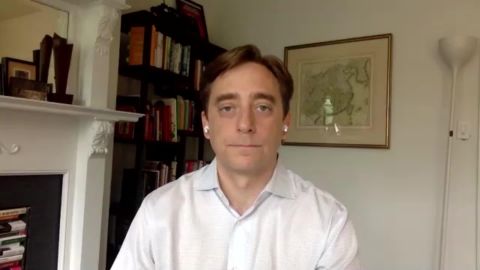Read Transcript EXPAND
DR. RICHARD HATCHETT, CEO, COALITION FOR EPIDEMIC PREPAREDNESS INNOVATIONS: We have said from the very beginning when we started our programs back in January that we thought if things went well that we could anticipate vaccines becoming more broadly available, potentially within 12 to 18 months. Obviously, several months have passed since then. We are seeing progress with our programs. We’ve got three of the vaccines that we’re supporting are in clinical trials right now. I think the timelines that we laid out then are still realistic. Is there a possibility that vaccines could become available in small amounts at an earlier timepoint? Yes. I think, possibly by the end of the year, we might see some small amounts of vaccine becoming available, but it’s hard to see how those timelines could be advanced much more quickly than that.
CHRISTIANE AMANPOUR: So, you’re still saying, despite — I mean, and you are the voice on this. So, you’re still saying 12 to 18 months is possible, because there’s a lot of others who are saying, you know, it’s really an incredibly high expectation, a high bar. They point out that, you know, quickest vaccine development, I think, on record was four years, and that was for mumps back in the 1950s.
HATCHETT: That’s right. That’s a famous story in vaccinology. Sorry about the background noise. That’s a famous story in vaccinology. Maurice Hilleman developed that mumps vaccine within four years. It does remain the fastest time from the basic development of a vaccine up until delivering it to market. We do see ways to compress the timelines and we have been working very diligently to do so, you know, compressing clinical development timelines and certainly compressing the manufacturing timelines. It is an aggressive and very ambitious timeline, but we’ve also seen remarkable advances. One of the vaccines that we’re supporting, the Moderna vaccine, actually entered clinical trials just nine weeks after the genetic sequences were released in january. It entered clinical trials in mid-March. We’ve had — as I’ve said, we’ve had other vaccines enter clinical trials. I believe there are six or seven vaccines now in clinical trials with a couple soon-to-begin phase II clinical trials. So, that’s — you know, that is extremely fast. And, you know, everyone around the world is looking at the — at how to compress those timelines even further. And particularly how to expand the manufacturing as quickly as possible, so that when the data accumulates, it shows that the vaccines are safe and effective, that we’ll be able to release vaccine quickly.
About This Episode EXPAND
Dr. RIchard Hatchett discusses efforts to speed up COVID-19 vaccine development. New Yorker staff writer Evan Osnos joins Michel Martin to examine President Trump’s rise to power and his chances of reelection in November. British folk singer Laura Marling discusses music, emotional healing and her new album.
LEARN MORE


